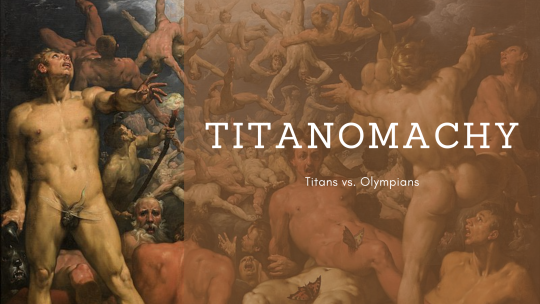Titanomachy: Titans vs. Olympians
Author's note: The following article was published on Spanish language in Blurt, in January 24th, 2021.

Banner made with Canva.
In the last post, we exposed the origin of the Titans, Uranus and Gaia's children. We learned about how they gave rise to the Golden Age, a period when the first human beings and the different natural elements emerged; we addressed Cronus' fear of being overthrown by one of his children and how he believed that devouring them was eluding the prophecy of Uranus and Gaia.
Now, this act of devouring children would be the starting point for one of the first long-lasting divine wars: The Titanomachy.
Zeus, who had been born in Crete, had remained hidden from Cronos for a considerable time; he was raised by his mother Rhea and his grandmother Gaia, who fed him the milk of the goat Amalthea and the honey of the bees (Cheers, 2009: 21). When he came of age, Zeus decided that it was time to face his father; in order to do it, he rescued his siblings by forcing his father to vomit.
Later he proclaimed himself as the king of the gods, a title that his relatives recognized with no problem. Then, he went to Tartarus, from where he freed his uncles, the Cyclopes and the Hecatonchires; they recognized him as a divine ruler (Tovar, 2021: 17) in exchange for fighting the Titans.
According to Robin Hard (2009), the Titanomachy, which lasted 10 years, was fought in the region of Thessaly. Cronus and his brothers took refuge in the southern area, precisely on Mount Othrys, from where they would launch a series of attacks against the young gods, who were settled on Mount Olympus, which was located in the northern area. It was, in the words of Hesiod, a battle in which "everywhere resounded the life-bearing earth engulfed in flames [...] (And) the whole Earth boiled, and the Ocean currents and the sterile pontus". In the end, Cronus and his brothers were thrown into Tartarus, where they have remained ever since.
As a celebration for their victory, the Olympians divided the universe and its domains; Zeus obtained for himself the rule of the heavens and the hand of Hera, his sister. Meanwhile, he granted Poseidon the rule of the sea, and to Hades the rule of the Underworld. The Hecatonchires were asked to guard the Titans' prison and spared the Titans Theia, Rhea, Tethys, Themis, Phoebe, Mnemosyne, Menoetius and Oceanus for their neutrality. Likewise, he punished Atlas, one of Iapetus' sons, with with holding Uranus himself for eternity, while Prometheus and Epithemeus, his brothers, were spared due to changing to the Olympian side.
To Zeus' disappointment, one of Iapetus' sons would soon turn his back on him for reasons justifiable to him. But we will learn more of that story in the next post.
Cited sources
- Cheers, Gordon (Editor). 2019. Mitología. España. RBA Editorial. English version of this book: Mythology . Mythhs, Legends and Fantasy
- Hard, Robin. 2009. The Routledge Handbook of Greek Mythology: Based on H.J. Rose's Handbook of Greek Mythology. Routledge Publishing House. Spanish version: El gran libro de la mitología griega. España. Editorial La Esfera de los Libros S.L.
- Hesiod. Theogony. Consulted in: Sacred Texts. Spanish version: Teogonía
- Tovar, Armando (editor). 2021. "Los habitantes del Olimpo", en: Muy Historia. México. Editorial Televisa. Enero 2021. Pp. 12 - 19.